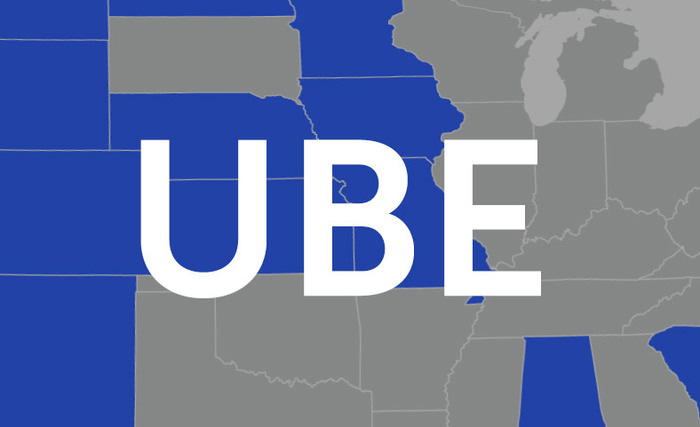With the addition of Texas in 2021, The Uniform Bar Exam has officially been adopted by 38 states and the District of Columbia.
Given the prevalence of the Uniform Bar Exam nationwide and the likelihood that even more states will continue to adopt it, we thought we should take a closer look at this exam.
UBE Components
Developed by the National Conference of Bar Examiners (NCBE), The Uniform Bar Exam (UBE) is administered in three parts. A 200-question multiple-choice portion called the Multistate Bar Examination (MBE), six essay questions called the Multistate Essay Examination (MEE), and a practical performance test called the Multistate Performance Test (MPT).
UBE Jurisdictions
As the name implies, the UBE is uniformly administered, graded, and scored by states that have adopted the UBE. Some jurisdictions require an additional, state-specific exam in addition to the UBE components listed above.
The UBE has currently been adopted by the following jurisdictions:
- Alabama
- Alaska
- Arizona
- Arkansas
- Colorado
- Connecticut
- District of Columbia
- Idaho
- Illinois
- Indiana
- Iowa
- Kansas
- Kentucky
- Maine
- Maryland
- Massachusetts
- Minnesota
- Missouri
- Montana
- Nebraska
- New Hampshire
- New Jersey
- New Mexico
- New York
- North Carolina
- North Dakota
- Ohio
- Oklahoma
- Oregon
- Pennsylvania
- Rhode Island
- South Carolina
- Tennessee
- Texas
- Utah
- Vermont
- Washington
- West Virginia
- Wyoming
While not technically UBE jurisdictions, the following jurisdictions either test or substantially test the UBE:
Grading of the UBE
The UBE is designed to test the knowledge and skills that every lawyer should be able to demonstrate prior to becoming licensed to practice law.
The NCBE scores the MBE component of the UBE while jurisdictions grade the MEE and MPT components.
The MBE is weighted 50%, the MEE 30%, and the MPT 20%.
UBE total scores are reported on a 400-point scale and each jurisdiction sets its own passing score.
UBE Schedule
The UBE is administered over two days with the MBE administered on the last Wednesday of both February and July, and the writing portion (i.e. the MEE & the MPT) is administered on the Tuesday immediately prior.
- Tuesday AM: Six 30-min Multistate Essays
- Tuesday PM: Two 90-min Multistate Performance Tests
- Wednesday AM: 100 Multistate Bar Exam multiple choice questions
- Wednesday PM: 100 Multistate Bar Exam multiple choice questions
Some jurisdictions, such as New York, require applicants to complete a jurisdiction-specific educational component and/or to pass a test on jurisdiction-specific law in addition to passing the UBE.
UBE Score Portability
The most intriguing aspect of the UBE is that you can transfer UBE scores from one UBE jurisdiction to another, assuming that your score meets the requirement of the jurisdiction you are attempting to transfer your UBE score to.
It is important to note that UBE jurisdictions will accept transferred scores that meet their own passing standards, whether or not the score met the passing standard in the testing jurisdiction.
So for example, if you sat for the UBE in Arizona where a 273 is required to pass, but failed with a score of a 270, you could nevertheless transfer this score to New York, where the minimum passing score is a 266.
Pretty convenient, no? Not only would you not have to retake the Arizona bar exam, but you would also get to move to New York and be barred without having to take the New York bar exam. Sounds like a win-win!
And it is precisely this convenience that will continue to pressure non-UBE jurisdictions to adopt the UBE.







